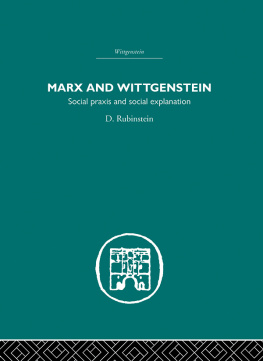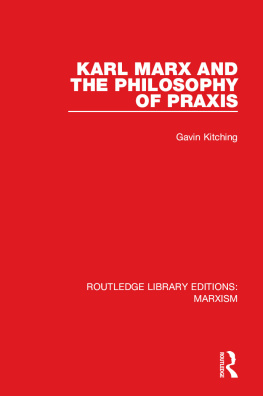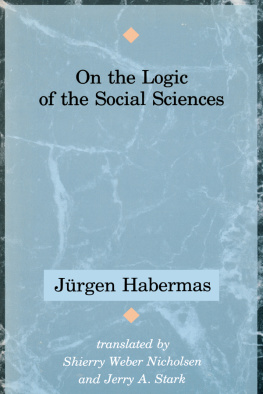MARX AND WITTGENSTEIN

ROUTLEDGE LIBRARY EDITIONS
WITTGENSTEIN
| Essays on Wittgensteins Tractatus | Edited by Irving M. Copt and Robert W. Beard |
| Marx and Wittgenstein: Social praxis and social explanation | D. Rubinstein |
| Studies in the Philosophy of Wittgenstein | Edited by Peter Winch |
| Wittgenstein: To follow a rule | Edited by Steven Holtzman and Christopher Leich |
| Wittgenstein: A critique | J.N. Findlay |
| Wittgenstein and Modern Philosophy | Justus Hartnack |
| Wittgensteins Philosophy of Language: Some aspects of its development | James Bogen |
| Wittgenstein and the Turning-Point in the Philosophy of Mathematics | S.G. Shanker |
MARX AND WITTGENSTEIN
Social praxis and social explanation
D. Rubinstein

First published in 1981
This edition first published 2006 by
Routledge
2 Park Square, Milton Park, Abingdon, Oxon, OX14 4RN
Routledge is an imprint of Taylor & Francis Group
Transferred to Digital Printing 2007
1981 D. Rubinstein
All rights reserved. No part of this book may be reprinted or reproduced or utilized in any form or by any electronic, mechanical, or other means, now known or hereafter invented, including photocopying and recording, or in any information storage or retrieval system, without permission in writing from the publishers.
The publishers have made every effort to contact authors and copyright holders of the works reprinted in the Wittgenstein series. This has not been possible in every case, however, and we would welcome correspondence from those individuals or organisations we have been unable to trace.
These reprints are taken from original copies of each book. In many cases the condition of these originals is not perfect. The publisher has gone to great lengths to ensure the quality of these reprints, but wishes to point out that certain characteristics of the original copies will, of necessity, be apparent in reprints thereof.
British Library Cataloguing in Publication Data
A CIP catalogue record for this book is available from the British Library
Marx and Wittgenstein
ISBN 0-415-38280-7 (volume)
ISBN 0-415-38278-5 (set)
Routledge Library Editions: Wittgenstein
Marx and Wittgenstein
Social Praxis and Social Explanation
David Rubinstein
Department of Sociology
University of Illinois,
Chicago Circle

First published in 1981
by Routledge
2 Park Square, Milton Park,
Abingdon, Oxon, 0X14 4RN
270 Madison Ave,
New York NY 10016
Set in IBM Press Roman, 10 on 11 pt
The Arcata Book Group
Copyright David Rubinstein 1981
No part of this book may be reproduced in any form without permission from the publisher, except for the quotation of brief passages in criticism
British Library Cataloguing in Publication Data
Rubinstein, David
Marx and Wittgenstein.
1. Marx, Karl - Sociology
2. Wittgenstein, Ludwig - Sociology
3. Social sciences
300. 1 B3305.M74 80-41294
ISBN 0-7100-0688-8
This book is dedicated to my parents, Florence and Jack Rubinstein, and to my son, Jacob
the philosophy of praxis this is the future fate of philosophy in general.
von Ciezkowski (1840)
The Praxis is where dialectical materialism both starts and finishes. The word itself denotes, in philosophical terms, what common sense refers to as real life. Dialectical Materialisms aim is nothing less than the rational expression of the Praxis, of the actual content of life.
Lefebvre (1940)
There are a number of friends and colleagues for whose remarks and criticisms I am grateful. Among these are Mildred Schwartz, R. Steven Warner, Steven Turner, Jeff Coulter, and Bill Bridges. I owe a special debt of gratitude to my good friend George Olson, who through many patient hours helped me through a variety of confusions and puzzlements regarding Wittgensteins thought.
This book has two primary objectives. The first is to show that there are substantial parallels between the work of Marx and Wittgenstein, and the second is to apply a synthesis of these two thinkers to a variety of philosophical and theoretical disputes over the character of the social sciences. Neither of these is a modest goal. The first has never, to my knowledge, been attempted, and is complicated by the confusing and often opaque nature of both Marxs and Wittgensteins work. It is difficult to say much about either without offending someones interpretation, and to speak of both together surely invites trouble. The difficulties of the second objective are of a different character. So much has been written recently in the philosophy of social science, and about Marxs and Wittgensteins social scientific implications, that it is difficult to say what has not already been said. But my belief is that Marx and Wittgenstein can be usefully synthesized, and that this will lead to some unique perspectives on the character of social scientific explanation. I will try to show that the concept of social praxis, derived from Marx and Wittgenstein, can resolve many central facets of the debate between objectivism and subjectivism, in large measure by under-mining some of the implicitly shared philosophical premises of both perspectives.
On the face of it, it would appear that the disparities between Marx and Wittgenstein are overwhelming. While he began his work as a philosopher, the greater part of Marxs work is devoted to historical and economic analysis. His philosophy seems to be undeveloped, and eventually incidental to his main concerns. Wittgensteins comments on society take the form of often bizarre anthropological fantasies that serve to illustrate philosophical points and apparently bear no clear relation to the workings of empirical societies. His writings on language would seem relevant only to the technical concerns of professional philosophers. Wittgensteins roots, if he has them, are obscure, but his work is generally considered in relation to philosophers such as Descartes, Kant, the mainstream of traditional philosophy, and the modern analytic movement. Marx emerges out of a Hegelian tradition, tempered by French political thought and British economic studies. These vast differences are reflected in the scholarly treatment of Marx and Wittgenstein. Marx has been juxtaposed to nearly every imaginable intellectual tradition, but only rarely have his followers considered Wittgenstein, and then typically to dismiss him with a puzzled contempt. Wittgensteins advocates have not often given this much consideration to Marx. It might seem that all Marx and Wittgenstein share is a penchant for cryptic and unsystematic aphorisms.
My aim in this book is to argue that, despite these great differences, Marx and Wittgenstein share some central doctrines. Most of these similarities constellate around their conceptions of human beings and their proper understanding. Some of their shared conceptions of persons comprise a philosophy of mind, but their concerns are really broader than this, and constitute a kind of philosophical anthropology. I will try to show in following chapters that Marx and Wittgenstein concur (1) that human beings are necessarily corporeal creatures, and that various properties of mind are conceivable only as features of the conduct of real, embodied persons; (2) that mind is not a feature of subjective consciousness but of action, (3) that understanding human actions and ideas requires an analysis of their social context; and (4) that human intelligence, i.e., a genuinely human being, necessarily emerges only in and through society. Many of these similarities come together in the view that mind and meaning are not properly conceived of as properties of individual consciousness, but of social order. In the history of thought, the notion that mind and meaning are properties of society has been treated with considerable skepticism, but one of my aims here will be to show that Marx and Wittgenstein provide some very plausible grounds for this view. They do this by showing that much of what has been conventionally considered to be a feature of subjective consciousness is in fact a property of social order. Additionally, I hope to show that Marx and Wittgenstein concur (5) that human knowledge of the world emerges out of an interaction of the social subject and the object. I will also argue (6) that both men present similar critiques of traditional philosophy, that lead to parallel conclusions as to how philosophy ought to be done, or, perhaps, undone.
Next page













